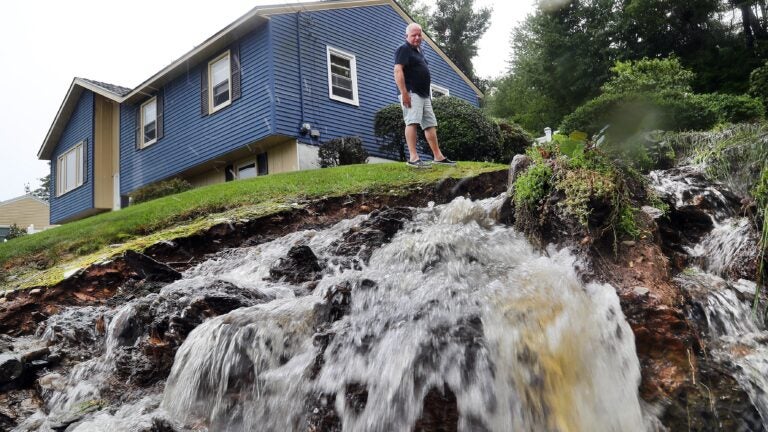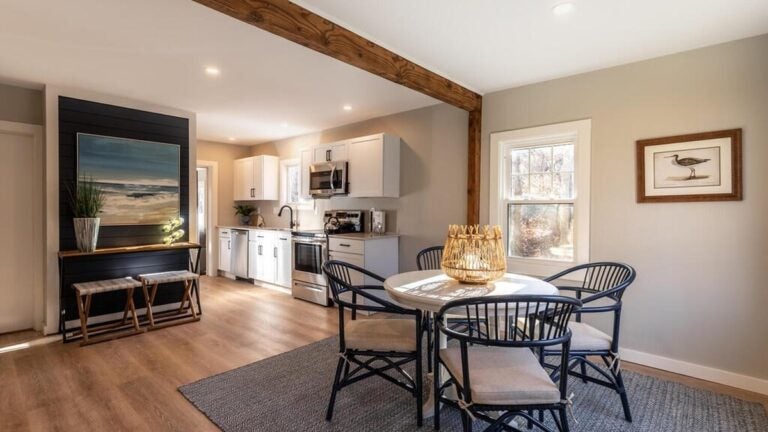Address newsletter
Get the latest news on buying, selling, renting, home design, and more.

Scientists tell us that as the Earth’s climate changes, we can expect to see warmer, wetter, more extreme weather patterns. Greater Boston’s housing stock is particularly old and vulnerable, but experts say there’s a lot you can do to make your home more comfortable and resilient.
One home improvement program available to many property owners in Massachusetts is Mass Save. If you live in a home served by Berkshire Gas, Cape Light Compact, Eversource, Liberty, National Grid, or Unitil, you may qualify for a free home energy assessment from Mass Save. The inspection will identify ways to improve your home’s energy efficiency, lowering your costs and improving comfort. The improvements range from replacing light bulbs with more efficient ones to swapping out old heating, ventilation, and air-conditioning equipment to upgrading windows to insulating the building. Many upgrades come with significant discounts and rebates.
The first thing every expert interviewed for this story suggested is insulating and sealing your building’s exterior walls and attic. Rachel White, chief executive officer of Byggmeister Design | Build, said doing that and taking advantage of the Mass Save assessment are “no-brainers.” Even partial renovations like a new kitchen offer opportunities to make big, long-term improvements, White said.
“Think about your house holistically, and use the renovation as an opportunity to improve the efficiency of your home overall,” she said. “This is not the time to skimp. … If you’re already doing a renovation, there’s no reason not, for example, to think about going with triple-pane windows. If you’re going to make the investment, think about what’s going to keep you comfortable and make your home more efficient for the next 20 years.”
White said there are also several things homeowners can do to keep their basements dry in a future expected to be stormier.
“We’re going to have more heavy precipitation events. We’ve had some of those this summer,” she said. “It’s very important to make sure the soil around your house is graded to drain water away from your foundation. And you’ve got to have clean, working gutters and downspouts that direct water away from the house as well.”
Stephanie Horowitz is the managing director of ZeroEnergy Design, a green architecture and mechanical design firm that specializes in high-performance buildings. She said there will be occasions when proper grading and working gutters aren’t enough to keep a basement dry.
“In New England we often find mechanical equipment is put in a basement,” Horowitz said. “If you have the opportunity to elevate it off the ground or even hang it from the ceiling, that’s something that may help that equipment stay dry in the event that the basement floods.”
If your heating system is old, she said, that can be a great opportunity to improve performance, safety, and resiliency. “If your heating system has reached the end of its useful life and you’re looking to electrify a home, switching from a boiler to an air source heat pump is something where you can reduce your reliance on unsafe fossil fuels, replace your heating, and gain a cooling system at the same time.”
When renovating older homes, she said, there are also simple, relatively inexpensive reinforcements that can protect older properties from wind damage.
“It’s important to remember that the majority of our housing stock of existing homes is not designed to the current building code,” she said. “That means when we renovate, there is an opportunity to reinforce them. We do things like put in hardware that helps to tie the roof to the walls and to reinforce roof rafters.”
‘Think about your house holistically, and use the renovation as an opportunity to improve the efficiency of your home overall.’
RACHEL WHITE
CEO Byggmeister Design | Build
More storms also mean more power outages, but Horowitz said she doesn’t necessarily recommend gas-powered generators to her Greater Boston clients, partially because of their use of fossil fuels. Most of her clients don’t need them, she said.
“Air sealing, good quality windows, extra insulation, that will keep a house warmer in the winter and help keep it cool in the summer,” she said. “In the Greater Boston area, generators are not very common. The grid goes out on occasion, but it usually comes back quite quickly. It’s typically more of an inconvenience for homeowners.”
Craig Foley is a real estate agent and the founder of Sustainable Real Estate Consulting Services, an LEED Green associate, and chief sustainability officer for LAER Realty Partners. He said climate change risk is very site specific. He advises clients to check with the municipality where they are considering buying a home. The major risk to coastal communities will be very different compared with heavily wooded, rural communities, he said.
“In Massachusetts, communities are funded to create climate vulnerability risk plans and climate action plans,” he said. “Engineers in cities and towns are spending time thinking about those risks using the latest data and producing public documents, climate vulnerability assessments, and climate action plans.”
Jim Morrison can be reached at [email protected].
Get the latest news on buying, selling, renting, home design, and more.

Stay up to date with everything Boston. Receive the latest news and breaking updates, straight from our newsroom to your inbox.
Conversation
This discussion has ended. Please join elsewhere on Boston.com